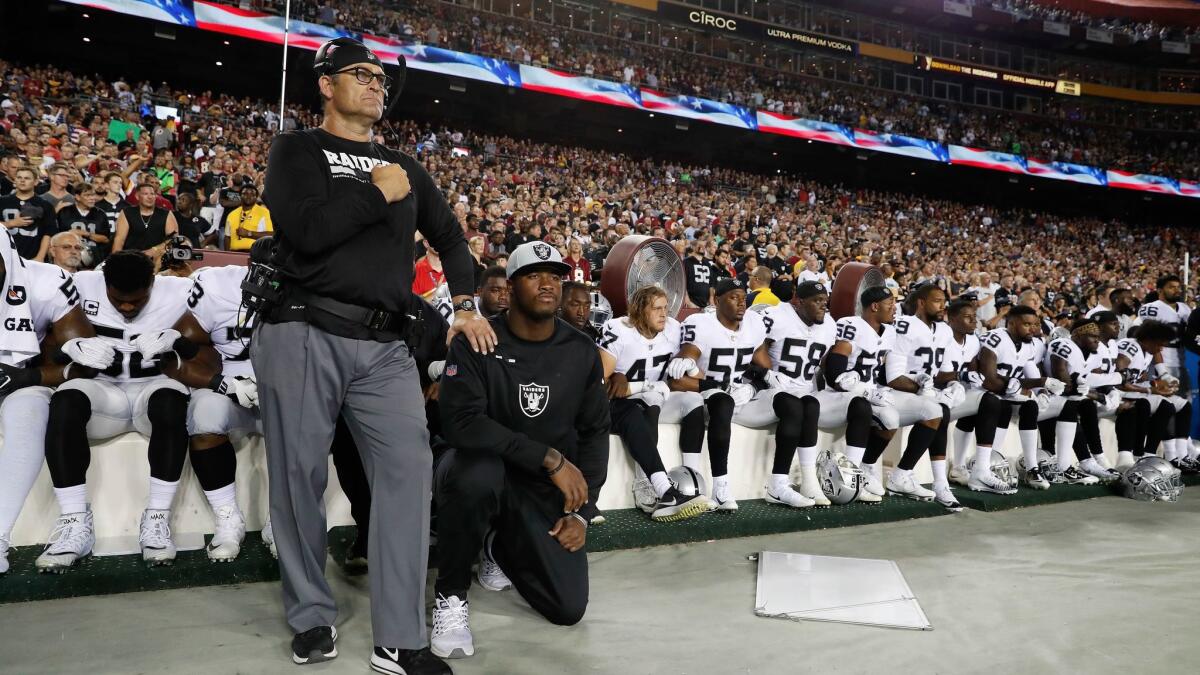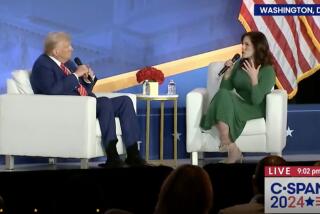Opinion: The right says liberals can’t stand free speech. Berkeley could take it; Trump can’t

This weekend’s news cycle was dominated by the sports world’s demonstrations during the national anthem, sparked by President Trump’s Friday statement that NFL owners should fire any “son of a bitch” who “disrespects our flag.” Lost in the background was the fact that right-wing provocateur Milo Yiannopolous’ self-titled “Free Speech Week” at UC Berkeley unraveled. After weeks of national hype, Yiannopolous, alt-right media figure Mike Cernovich, and anti-Islam author Pamela Gellar abruptly canceled the event, showing up on campus for a mere 15 minutes.
Had dozens of the most powerful figures in American sports not demonstrated this weekend, Yiannopolous would likely be milking the cancellation for all it was worth. This was never about “free speech”; it was always about Yiannopolous’ massive ego and his thirst for relevance. Simply because Yiannopolous labeled his event “Free Speech Week,” too many viewed it as a battle between free speech crusaders and a PC university willing to constrain that speech. But we need to consider the credibility of the person or organization that sets the terms of the debate, and interrogate these frames for ourselves.
Lucian Wintrich, an alt-right blogger who had been listed as a speaker, told the university that the week had been a set-up from the jump. Neither Yiannopolous nor the sponsoring student group—the Berkeley Patriot, a shell organization that has somewhere between five and 20 members—feigned organizational competence. Many of the listed speakers said they’d never even been invited; one of those speakers, Charles Murray, went so far as to call Yiannopolous a “despicable …,” using an expletive. Meanwhile, the university administration devoted weeks of planning and hundreds of thousands of dollars to security for the event.
But flag-waving conservatives have shown time and time again that they believe in free speech only when it’s their speech—the exact hypocrisy they accuse liberals of. It’s master manipulation, and it’s sickeningly transparent.
Athletes are genuinely using free speech to draw attention to the issue of racism and police brutality in America. They’re now being slandered by the president of the United States for doing so, as he demands that Americans who have the temerity to demonstrate against police brutality during “The Star Spangled Banner” be fired.
Meanwhile, Yiannopolis is leveraging the idea of free speech for his own ends, riding the issue’s coattails to stay in the media spotlight after being fired from Breitbart for appearing to endorse pedophilia.
Why are we, as members of the media and general public alike, so very vulnerable to discussing issues in the terms that the loudest and brashest use, rather than in a frame that would withstand deeper scrutiny?
Trump has tweeted about athletes kneeling during the national anthem nearly 20 times since his comments on Friday night. Monday morning he wrote, “The issue of kneeling has nothing to do with race. It is about respect for our Country, Flag and National Anthem.”
Trump’s supporters — and too many in the media — immediately accepted this framing of the issue and inserted yet another layer of meaning, insinuating that these protests are against Trump himself. In so doing, they conflate the American flag and what it stands for with the country’s leader, meaning that to speak against him is to speak against the country. That’s an absurd, authoritarian idea, and has nothing to do with our founding principles.
And as for Trump’s “nothing to do with race” tweet, he’s either a total idiot or lying through his teeth. To Colin Kaepernick — the quarterback who originated the anthem demonstrations last year while playing for the San Francisco 49ers, and who for many months demonstrated alone — kneeling had everything to do with race. Several weeks before Kaepernick first knelt in a preseason game, Alton Sterling and Philando Castile were shot dead by police officers a day apart. Both men’s killings were filmed; public outrage over the deaths of black Americans at the hands of police officers had then reached a fever pitch.
“I am not going to stand up to show pride in a flag for a country that oppresses black people and people of color,” Kaepernick told NFL media in August 2016. “To me, this is bigger than football and it would be selfish on my part to look the other way. There are bodies in the street and people getting paid leave and getting away with murder.”
Tell me where that’s unclear.
How can we justify discussing the anthem demonstrations from Trump’s perspective rather than from the perspective of the man who originated them?
There’s an interesting conversation to be had about free speech and hate speech on college campuses and elsewhere, but that conversation was never going to be led by Yiannopolous. There’s an interesting conversation to be had about anthem demonstrations, but that conversation was never going to be led by Trump. Both Yiannopolous and Trump are noncredible sources who have purposefully and repeatedly manipulated the media and their followers. They have made innumerable racist and sexist statements. They have worn their profound cruelties as badges of honor.
They are effective because they’re loud and they lie. They speak to our ids and activate our basest fears.
Kaepernick, meanwhile, is a man of quiet integrity. He declined multiple interview requests for a recent massive New York Times profile; as the piece put it: “Kaepernick has stayed out of the spotlight, friends said, because he wants the conversation to not be about him, but about the issues he has raised.” Kaepernick paid a steep price for staying true to himself and his commitment to justice; he’s out of a job this season.
You can say that Berkeley shut down Yiannopolous’ week of speakers because the university was afraid of “free speech.” But if we look at the available evidence, we will find this is not the case.
You can say that those athletes who kneel during the national anthem are unpatriotic. But if we look at the available evidence — from our own constitution, to their statements to the press and their followers, to their conduct on and off the field — we will find this is not the case.
David Foster Wallace said: “The only thing that’s capital-T True is that you get to decide how you’re going to try to see it. You get to consciously decide what has meaning and what doesn’t. You get to decide what to worship.”
This is a moment when we can decide to stand strong against poisonous messaging and determine for ourselves what has meaning and what doesn’t. The decisions we make tell us who we are.
Melissa Batchelor Warnke is a contributing writer to Opinion. Follow her @velvetmelvis on Twitter.
Follow the Opinion section on Twitter @latimesopinion and Facebook
More to Read
A cure for the common opinion
Get thought-provoking perspectives with our weekly newsletter.
You may occasionally receive promotional content from the Los Angeles Times.











